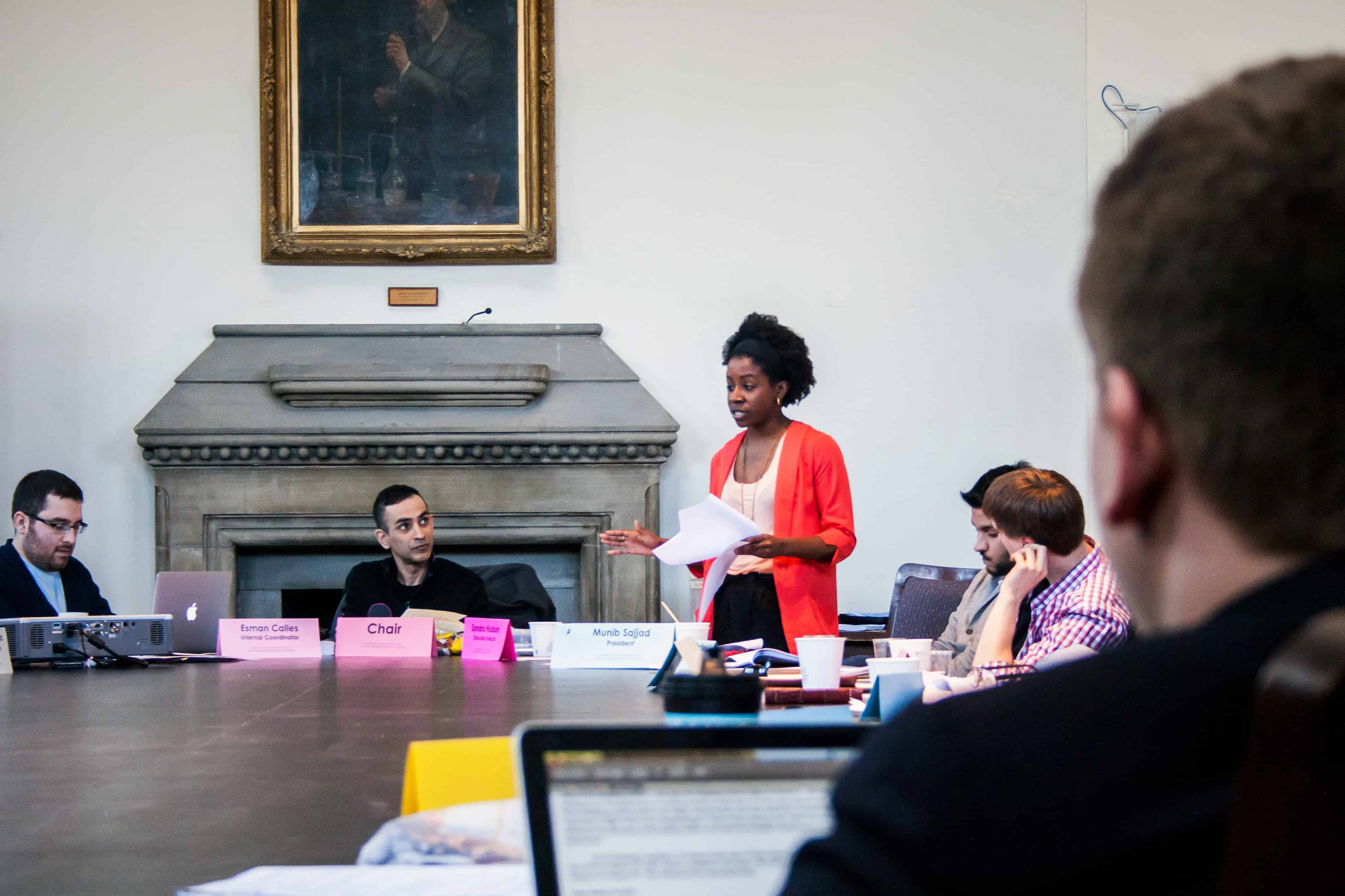The University of Toronto Students’ Union’s board of directors met Thursday to pass dramatic changes to the board’s structure, which would eliminate college and most divisional directors while adding constituency directors to represent marginalized groups. The board also voted to reject two complaints over the union’s controversial spring executive elections.
The board is currently composed of the UTSU executives; Division I directors from each college, the Faculty of Arts & Science, and the Transitional Year Program; Division II directors from the professional faculties; and Division III directors from UTM.
Almost all college and divisional societies — including vocal critics such as Engineering and Trinity, who overwhelmingly voted to leave the union last year — will lose board representation. The only societies that will still have representative directors are the Transitional Year Program (TYP) and UTM.
Under the new structure, the board would be composed of 10 constituency directors, representing international students, LGBTQ students, women, racialized students, indigenous students, mature students, students with disabilites, commuters, athletics, and first year students. The new structure also adds a third at-large director position for both the arts & science and professional faculty positions. TYP will keep its one director, and UTM will now have four directors.
At a meeting of the UTSU’s Policy and Procedures Committee on April 9, Cameron Wathey, vice-president, internal & services, said that the proposal was still in its beginning stages. During the summer and fall terms, union executives plan to consult students’ societies, clubs, and service groups to solicit feedback on the proposed changes.
At Thursday’s board meeting, UTSU president Munib Sajjad said that the changes arose from the need to provide a voice for underrepresented communities.
“We, as directors of the board… could look at how we could be working better to represent students in such a wide diversity of issues,” Sajjad said, adding: “It’s evolutionary. It’s revolutionary.”
A number of college leaders expressed concern over the proposed changes, including concerns over the logistics of electing directors.
“It is disturbing to see how the UTSU has decided to address longstanding concerns,” said Benjamin Crase, outgoing co-head of Trinity College, adding: “The introduction of a pseudo-sectarian structure of governance makes little sense and is very worrisome.”
Rowan DeBues, president-elect of the Victoria University Students’ Administrative Council (VUSAC) said that the board of directors is not currently representative enough of minorities and special groups. However, he argued that the proposed board structure would assign voting rights without regard to population size.
“I understand that there are certain groups that definitely need a voice at the table due to the important issues facing them, however there are so many students that may not see themselves as fitting into these criteria,” DeBues said.
DeBues also noted that it is currently the job of college directors to represent constituents regardless of background.
The new board structure also gives the executive director, currently Sandy Hudson, signing authority, and the appointed vice-president campus life a vote on the executive committee. At the meeting Zijian Yang, the only executive candidate from the incument slate to lose, was appointed VP campus life.
The board also voted to remove the requirement for an open nomination process and one-year renewable term for the UTSU speaker. Ashkon Hashemi was reappointed to the role. Hashemi serves similar roles at a number of other unions affiliated with the Canadian Federation of Students and has worked for the UTSU in some capacity since as early as 2002.
Sajjad did not respond to requests for comment. The restructuring motion will now go to the union’s next general meeting in the fall of 2014, for final approval.
The board also voted to resolve two outstanding grievances from the recent UTSU executive election.
Since the elections in March, the union has faced increasing criticism from some students over allegation of systemic unfairness and illegal decision-making during the election. Recently, some complainants have called on the U of T administration to step in over concerns the UTSU is acting in an undemocratic manner. On March 26, the vice-provost, students, formally requested that the UTSU preserve certain ballot boxes from the election until her investigation of the complaints is complete.
“A student society that so brazenly violates the right of its members to an open, accessible, and democratic students’ union, and that ignores its own constitution, should not receive student fees until it corrects its mistakes through concrete actions” wrote Vipulan Vigneswaran, Team Unite’s campaign manager. Vigneswaran filed two complains over the way the election was run. Both were dismissed at Thursday’s board meeting after a weeks-long grievance process.
At a grievance resolution meeting on April 11, Team Unite agreed to seek a vote of the UTSU board requesting the resignation of the 2014-2015 executive-elect as a resolution to their grievance. At Thursday’s meeting, the board rejected the request.
“The grievance procedure isn’t good at solving things, especially if the speaker says things can’t be changed. It just wasted everyone’s time. Hopefully, we can move forward with [university administration] and a compromise can be reached” said Vigneswaran.
Vigneswaran alleges that the UTSU even violated their own grievance procedure, by telling him he couldn’t speak to the media or university administration about his concerns, and if he did his case would be summarily thrown out. A new grievance procedure was adopted last year and used for the first time in this case. The procedure does not stipulate a requirement not to communicate with the media or university administration.
University administration remains tightlipped about whether they will intervene in the election. “In accordance with the Policy for Compulsory Non-Academic Incidental Fees, UTSU will be provided the opportunity to comment on the allegations and the Office of the Vice-President and Provost will undertake an assessment of the complaint. At this time, it is premature to speculate on potential outcomes,” said Michael Kennedy, a university spokesperson.


